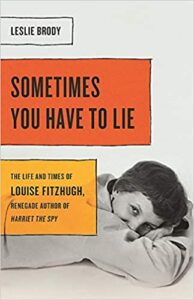January 29, 2021
Sometimes You Have to Lie, by Leslie Brody
While Harriet M. Welsch put the truth in her notebooks, Louise Fitzhugh, who created her, kept her own truth closer to her chest, and it stayed guarded for years ever after, her literary executors and friends fiercely protective of the author. An academic book was published in 1991 that did provide some insight into the life and times of Fitzhugh, but its author was not granted proper access to archives and the book was kind of middling, and so we’ve had to wait all the way until now for a proper literary biography, Sometimes You Have to Lie, by Leslie Brody, whose previous work as biographer includes a book about Jessica Mitford, so you just know this is the kind of work you want to get behind.
Louise Fitzhugh’s story is pretty wild, and also sad. Her mother was a dancer and her father was a millionaire. They met on a transatlantic crossing in the 1920s, marrying in a whirlwind, and the whole thing was a terrible idea. Their daughter, Louise, suffered in the fallout, subject of a much publicized custody conflict, which her father won, and prohibited her mother from seeing her for years. Essentially raised by nursemaids, Fitzhugh grew up privileged in the Jim Crow South, and was well aware of the injustice that surrounded her. Also, much like Harriet, she seemed to always know exactly who she was, dating women while still in high school and not caring a fig for social convention.
Like many before her, she fled to New York City, seeking a creative life. She found success as a painter, but such success is relative—it’s a tough life, even for an heiress. She found her way into publishing by illustrating a picture book, Suzuki Beane, written by Sandra Scoppettone, a satire of the Eloise books set in beatnik Greenwich Village, and then eventually a few very rough pages of what would become Harriet the Spy found their way to Ursula Nordstrom, legendary editor of authors like EB White, Maurice Sendak, Margaret Wise Brown, and more.
Fitzhugh was not a people-pleaser, although she was well-liked and had a lot of friends, connected to many through artistic and lesbian circles. But it’s hard out there for a sensitive person, and she struggled to fit into most roles that were assigned to her, children’s book author among them. She refused to do publicity for her books. She had fallings out with her editors. She had trouble with her health, and didn’t heed doctors’ advice to stop drinking. And then in 1974, she published the novel Nobody’s Family is Going to Change, received a devastating review in Publisher’s Weekly, and then died. It was a brain aneurysm and possibly the two events were unrelated, but still. Honestly, it’s the kind of blunt conclusion that would come out of Harriet’s notebook. (“MY MOTHER IS ALWAYS SAYING PINKY WHITEHEAD’S WHOLE PROBLEM IS HIS MOTHER. DOES HIS MOTHER HATE HIM? IF I HAD HIM I’D HATE HIM.”)
I loved this book. Fitzhugh’s life was as fascinating as her work, just as complicated too and tricky to parse, and Brody really does her justice.






